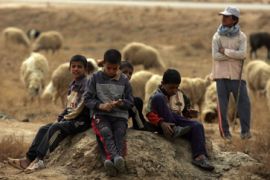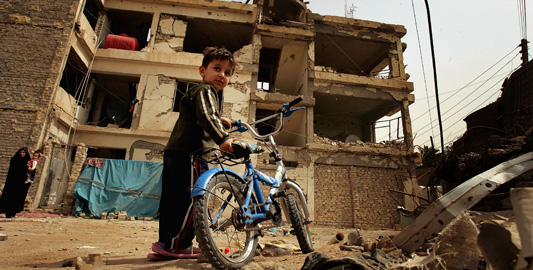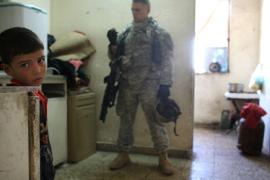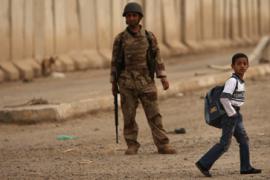Activist: Iraqi youth must rebuild
He calls on his countrymen to unite and end the exploitation of their misery.

 |
|
Iraqi youth face a monumental challenge in the decades ahead as they strive to overcome a childhood plagued by violence [GALLO/ GETTY]
|
“It will be a long time before you come back,” my Aunt Amal predicted as I was lifted off of my dusty wheelchair into a taxi that would take me out of Iraq.
It has been five years since that day, and since the launch of the most brutal and profitable military campaign in modern history.
Five years ago, the US military spearheaded a campaign to occupy and destroy Iraq. The war, perversely named “Operation Iraqi Freedom,” has claimed the lives of over 1 million people and has displaced more than 5 million others, forcing them to live in desperate conditions around the world.
Democracy in Iraq remains as likely as a snowstorm on a hot Basra day. Women and minorities, groups that were said to have been repressed by Saddam Hussein and used as justifications for the invasion, have now lost virtually all of their rights.
No improvement
“Going out alone is just impossible,” said a young Iraqi dentist hoping to flee and live in Toronto.
The 33-year-old mother of two, who asked for anonymity out of fear for her life, said she was forced to close down her thriving practice in the heart of Baghdad after receiving threats from armed militia operating under the watchful eyes of the current Iraqi government.
The rights of women have suffered to an even greater extent when it comes to the violence waged against them by US and British occupying forces.
One cannot forget the story of Abeer, a 14-year-old girl raped by four US soldiers before she was shot and her corpse burned to hide the evidence.
There is nothing in Iraq that has improved since the occupation. In fact, the situation is worse now than during the murderous dictatorship of the former government and the UN-imposed sanctions regime.
‘Systematic theft’
 |
| Iraqi children are fearful when US soldiers canvas their home towns [GALLO/ GETTY] |
Every facet of civil society and every sign of infrastructure has been turned into rubble and swept under the blanket of so-called reconstruction.
This is a misnomer, a cover for the largest systematic theft of a country’s resources since the pillaging of indigenous and African communities by European colonisers.
Unfettered access to oil is just one of the ways the international business elite has been able to cash in on the pillaging of Iraq.
Fake contracts, rotten goods and overpaid administrators have formed the legacy of the much-anticipated reconstruction. Their work has resulted in the disappearance of billions of dollars that impoverished Iraqis badly needed. Now, they live on nothing.
Complicit countrymen
Though all indicators point to an Iraqi holocaust with very obvious perpetrators, the Americans and the Iraqi government are still portrayed as mismanagers of a liberation gone wrong.
Shamefully, the Iraqi community outside the country is complicit in shaping this false and harmful discourse. Myths about civil war and superficial analyses of sectarian violence decorate the cold and strange streets of Western cities like Toronto where I have been a refugee.
Fellow Iraqis, and not just Canadian immigration officials, have ironically magnified the sharpness of my displacement.
When the Americans declared the completion of their horrific takeover on April 9, 2003, Iraqis from Abu Dhabi to Detroit danced in the streets while members of their families back home buried those who died after the horrors of shock and awe.
Iraqi businessmen couldn’t wait to hop on private jets or take luxury cars across war zones to set up shop in cities like Baghdad, where they were able to transfer the fruits of war into their foreign bank accounts.
Iraqis sell out
|
|
| Iraqi youth carry the psychological scars of war [GALLO/ GETTY] |
Members of Iraqi NGOs, which operated as a direct arm of the American occupation, held up empty bloodied banners trumpeting democracy and human rights, greeting the perpetrators of the violence as if they were diplomats and legitimate representatives of a beleaguered people.
Iraqi youth celebrated in the hundreds for the heroic achievements of the Iraqi football team but remained at home, glued to their seats, when millions from across the world took to the streets to oppose the slaughter of Iraqis.
|
|
|
|
Most Iraqis living outside of the country after the occupation ran to the global polling booths in the ridiculous elections charade of 2005, while most living under occupation were running for their lives in the daily grind to get the basic necessities.
In Toronto, the schisms running through the Iraqi community are completely reflective of the vision America and its functionaries in the Iraqi government have for our people.
Voices opposing the occupation are labeled as Saddamists or sectarian and most community initiatives refuse to involve an anti-occupation banner; they refer to the violence as tragic without laying blame on those who are responsible.
Instead, many Iraqis point fingers at fellow Arabs, including Palestinians living under Israeli apartheid, in a classic case of divide and conquer.
Calling on Iraqis
|
Related link | ||
|
To this day, there are no Canadian Iraqi organisations that have an open position against the occupation.
Millions of dollars have been comfortably raised for charities claiming to help Iraqi children, but only a handful of events have included discussions on how Iraqis can organise against the occupation in their communities.
Hadeel Al Shameri, a 21-year-old university student in Toronto and co-organiser of a series of days commemorating the fifth anniversary of the war, says being an Iraqi automatically makes her duty-bound to try and help her people.
“It has been a long time overdue for events such as these that say clearly, as Iraqis, we know exactly who is responsible for the destruction of Iraq, and we are opposed to their actions,” she said.
Al Shameri and fellow Iraqi youth are organising lectures, movie screenings and performances to encourage more activism within the Iraqi community against the occupation.
Several Canadian groups and student organisations have also contributed to the efforts.
It is through Iraqi youth initiatives like these that we can come closer to ending the exploitation of the misery of our fellow Iraqis.
Last week, in the confusion of midday traffic of Toronto, my cell phone rang, and it was my Aunt Amal. When I told her that I still hope to return to the city that I miss so much, she said, “Baghdad is destroyed, everything is destroyed. We live in destruction.”
Ahmed Habib is an activist, journalist, radio host and creative coordinator with Independent Arabic Media.

